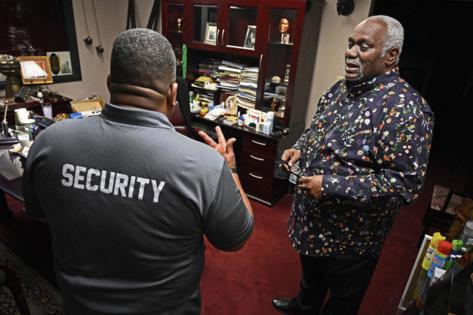Protecting the flock: a complicated challenge amid rising threats to churches
Published in News & Features
Across America, churches meant to be sanctuaries are facing deadly threats in the 21st century, and safeguarding congregations from attacks has become increasingly challenging.
Church security is a hugely complicated field, experts say, one that brings no one-size-fits-all solutions and few easy answers. Churches range in size from tiny congregations in storefronts to conglomerate-style enterprises in amphitheaters so big they feel like sports arenas — all with unique layouts, from the placement of windows and hallways to the size and configuration of rooms.
Unlike some public buildings, churches need open access to carry out their functions, said Michael Toomey, the president of Secom, a Columbia firm that provides protective technologies for government agencies and houses of worship across the U.S.
“You want people to be able to walk around freely, not be faced with a lot of security barriers,” Toomey said. “That’s one of the things that makes churches a ‘soft target.'”
Secom and other firms have developed new tools to counter attacks, including AI-equipped surveillance cameras that detect suspicious behavior and send instant alerts — or even lockdown signals — within seconds.
They might have prevented such tragedies as the mass shooting that killed 27 people at a Baptist church in Sutherland Springs, Texas, in 2017. The assailant in that case fired at individuals outside the building and might have been stopped before entering the church.
One problem is the price. A full-fledged state-of-the-art security system can cost between $40,000 and $100,000. It could include anything from apps that can buzz congregants, take over their laptops, or alert law enforcement, to alarms that trigger sirens and flashing strobes.
But an investment of $3,000 can mean a significant upgrade, said Geno Roefaro, the CEO of SaferWatch, a Florida company that provides advanced security technology.
“How many more warning signs do you really need to prioritize safety?” he said.
Government programs do offer security grants to vulnerable nonprofits, including houses of worship and parochial schools. The federal Nonprofit Security Grant Program provides funding for security upgrades, while Maryland offers two state options — the Protecting Against Hate Crimes Grant and the Hate Crimes Grant through the Maryland Center for School Safety.
Critics argue that taxpayers’ funds should not be used for religious establishments, but proponents claim that the economic impact of upgrades can be both direct and indirect, reducing crime, boosting local businesses, and increasing property values.
The Archdiocese of Baltimore has no uniform security policy for its parishes but urges each to prioritize safety, said Tom Alban, the diocese’s director of risk management. The archdiocese offers training for hundreds of volunteers who serve on church security teams. Many are armed and have military or law enforcement backgrounds.
Parishes also follow best-practice procedures such as having single points of entry, providing bullet-resistant glass, keeping close ties with police and other agencies, and simply encouraging greeters and parishioners to engage with all who enter.
Some have been able to provide armed private security and upgrade surveillance, Alban said, adding that the archdiocese is applying for the DHS grants.
So are officials at Grace Fellowship Church in Timonium, a congregation with about 4,000 members. Pastor Vincenzo Leone has trained teams of volunteers to monitor the church, many of them quietly armed. Officials have a well-rehearsed action plan in place for when a pastor senses anything amiss from the pulpit.
But the system continues to evolve, and Leone said his team is applying for grants in hopes of making them even stronger.
“It’s sad, but the world has changed,” he said.
_____
©2025 Baltimore Sun. Visit baltimoresun.com. Distributed by Tribune Content Agency, LLC.







Comments